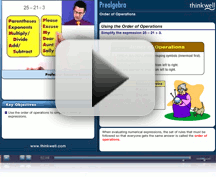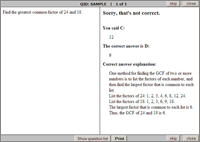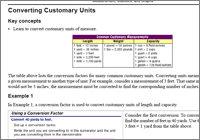Foundations of Mathematics
Thinkwell's Foundations of Mathematics offers a focused approach to our Pre-algebra curriculum. With its emphasis on such basics as integers, fractions, decimals, and percents, it's the perfect resource for students wanting a fundamentals-based approach to mathematics.
Foundations of Mathematics is customized specifically for the Technical Colleges of Georgia.
Our complete Foundations of Mathematics package includes:- 12-month Online Subscription to our complete Foundations of Mathematics course with video lessons, automatically graded exercises, and much more.
- Workbook (optional) with lecture notes, sample problems, and exercises so that you can study even when away from the computer.
Workbook requires the purchase of an online subscription.
Money-Back Guarantee
Foundations of Mathematics Materials
Online Subscription, 12-month access
Access to a complete online package that includes everything you need:
- High quality video lessons explain all of the Foundations of Mathematics concepts
- Automatically graded exercises with immediate feedback allow you to track your progress
- Printable full-color illustrated notes help you review what you've learned in the video lesson
- Subscriptions start when you are ready. Buy now and activate your course anytime you like. Wait up to one year to activate your subscription; your 12-month subscription doesn't begin until you say so!
Workbook, Notes, sample problems, exercises, and practice problems
Study without a computer. Our workbook companion contains the same lecture notes and sample problems that are delivered online, as well as some additional exercises, all in a convenient print format. Answers to the odd-numbered exercises are in the back of the book. Online Subscription is required; workbook not sold separately.
Foundations of Mathematics Details
Thinkwell's Foundations of Mathematics includes all of these features for your student:
- More than 100 video tutorials (see sample)
- 1000+ automatically graded Pre-Algebra problems (see sample)
- Real-world application examples in both lectures and exercises
- Printable illustrated notes for each topic
- Searchable glossary of mathematical terms
- Engaging content to help students advance their mathematical knowledge:
- Operations with whole numbers, integers, decimals, and fractions
- Variables and expressions
- One-step, two-step, and multi-step equations and inequalities
- Ratios, proportions, and percents
- Simple and compound interest
- Customary and metric units of measurement
- Organizing, displaying, and interpreting data
- Graphing equations and slopes
- Polygons and solids
- The Pythagorean theorem
- Exponents
- Polynomials
- Probability
Table of Contents
(Expand All - Close All)1. Integers
- 1.1 Introduction to Integers
- 1.1.1 Integers and the Number Line
- 1.2 Operations with Integers
- 1.2.1 Addition of Integers
- 1.2.2 Subtraction of Integers
- 1.2.3 Multiplication and Division of Integers
- 1.2.4 Introduction to Exponents
- 1.2.5 Using the Order of Operations
2. Fractions
- 2.1 Introduction to Fractions
- 2.1.1 Factors, Multiples, and Equivalent Fractions
- 2.2 Operations with Fractions
- 2.2.1 Multiplying Fractions and Mixed Numbers
- 2.2.2 Dividing Fractions and Mixed Numbers
- 2.2.3 Adding and Subtracting Fractions and Mixed Numbers
3. Decimals
- 3.1 Introduction to Decimals
- 3.1.1 Representing, Comparing, and Ordering Decimals
- 3.1.2 Rounding and Estimating Decimals
- 3.2 Operations with Decimals
- 3.2.1 Adding and Subtracting Decimals
- 3.2.2 Multiplying Decimals
- 3.2.3 Dividing Decimals
- 3.3 Fractions and Decimals
- 3.3.1 Converting between Fractions and Decimals
- 3.3.2 The Order of Operations with Fractions and Decimals
4. Ratios, Proportions, and Percents
- 4.1 Ratios and Proportions
- 4.1.1 Ratios and Rates
- 4.1.2 Proportions
- 4.1.3 Finding an Unknown Value in a Proportion
- 4.1.4 Applications of Proportions
- 4.2 Percents
- 4.2.1 Introduction to Percents
- 4.2.2 Percents
- 4.2.3 Relating Percents, Decimals, and Fractions
- 4.2.4 Estimating with Percents
- 4.2.5 Finding and Using Percents
5. Variables, Expressions, and Equations
- 5.1 Introduction to Equations
- 5.1.1 Variables and Expressions
- 5.1.2 Translating Between Words and Math
- 5.1.3 Simplifying Algebraic Expressions
- 5.1.4 Translating Between Tables and Expressions
- 5.1.5 Equations and Their Solutions
- 5.2 Introduction to Solving Equations
- 5.2.1 Solving Addition Equations
- 5.2.2 Solving Subtraction Equations
- 5.2.3 Solving Multiplication Equations
- 5.2.4 Solving Division Equations
- 5.3 Solving Equations
- 5.3.1 Solving Equations Containing Integers
- 5.3.2 Writing and Solving Two-Step Equations
- 5.3.3 Writing and Solving Multi-Step Equations
- 5.3.4 Solving Equations with Variables on Both Sides
- 5.3.5 Solving Literal Equations
6. Measurement
- 6.1 Measurement
- 6.1.1 Understanding Customary Units of Measurement
- 6.1.2 Understanding Metric Units of Measurement
- 6.1.3 Converting Customary Units
- 6.1.4 Converting Metric Units
- 6.1.5 Converting between Customary and Metric Units
- 6.1.6 Time and Temperature
7. Geometry
- 7.1 Polygons
- 7.1.1 Triangles
- 7.1.2 Quadrilaterals
- 7.1.3 Finding Angles in Polygons
- 7.2 Area, Perimeter, and Circumference
- 7.2.1 Perimeter
- 7.2.2 Area of Rectangles and Parallelograms
- 7.2.3 Circles and Circumference
- 7.2.4 Area of Circles
- 7.3 Solids
- 7.3.1 Introduction to Three-Dimensional Figures
- 7.3.2 Volume of Prisms and Cylinders
8. Statistics and Graphs
- 8.1 Organizing, Displaying, and Interpreting Data
- 8.1.1 Organizing Data
- 8.1.2 Bar Graphs and Histograms
- 8.1.3 Line Graphs
- 8.1.4 Reading and Interpreting Circle Graphs
- 8.1.5 Measures of Central Tendency
About the Author

Video Lessons

Interactive Exercises


